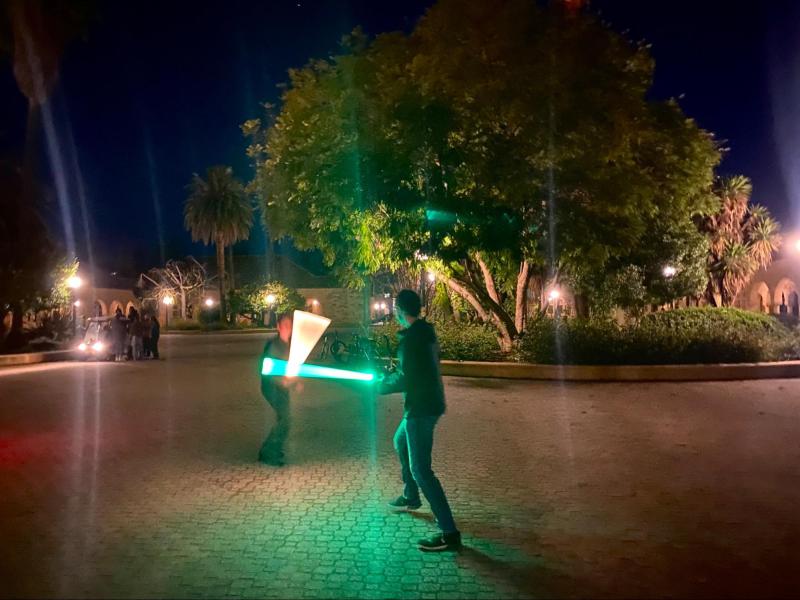Under a clear, dark sky last Sunday night, hundreds of students resurrected the long-absent Stanford tradition of “Full Moon on the Quad” (FMOTQ) for the first time since January 2020.
First held in the 1940s as a student-led rite of passage where senior men presented roses and exchanged kisses with freshman women, the event is now marketed as a chance for people of all genders and sexualities to revel in a night of no-strings-attached kissing.
FMOTQ was canceled by Stanford administration in 2021 and 2022 due to the COVID-19 pandemic, and as the traditional date of the event approached – the first full moon of Winter Quarter – no plans had been formalized.
Along with other class cabinets, the Junior Class Cabinet, which typically plans the event, has been asked to prioritize single class events, according to a statement from ASSU president Daryl Thomspon ’23 on behalf of the ASSU Executive Team. Some students have still taken this tradition’s neglect as a sign of the loss of Stanford’s freewheeling fun since 2020.
Only an hour before the informal event, ASSU executives emailed a survey requesting feedback about their plans for FMOTQ — the slow process of finding an official student group to lead it had already delayed their planning process, according to the ASSU statement.
But by the time the email was sent, it was too late. Students had already taken the tradition into their own hands.
In the absence of university support, students planned and promoted the event themselves through the campus social media app Fizz. On the day of the event, anonymous posts on the app about FMOTQ surged, and many participants only heard about it hours before the start time.
Even so, when the hour struck, as many as 800 attendees arrived at Main Quad, and for most of the event’s runtime between 11:30 p.m. and 12:30 a.m., students stood in groups.
“People were keeping their space, and it was pretty awkward. If everyone comes to watch, there’s no event,” Gabi Reitz ’25 said. Around the periphery of the huddle, a handful of students played with brightly colored lightsabers rather than engage in the gathered group.

Mainstays of FMOTQ in prior years were not present, such as the marching band, nude and body painted attendees, live or DJ’ed music and the Stanford Tree (perhaps reluctant to participate after their recent monthslong suspension). A decade ago, participants would count kisses on bingo cards or on their arm, counting dozens or hundreds of kisses – one Stanford Tree claimed the record was over a thousand.
While this year’s event was less wild than past years, Sebastian Vasquez ’26 said that the energy picked up after midnight and had a good community feeling. Oliver Sibal ’23, who stopped by only out of curiosity about the tradition’s fate, described the event as a more “wholesome” vibe compared to the “raucous nature of its past” in 2020 and before.
The nature of the event has invited scrutiny as to standards of consent, its accommodation of all sexual and romantic orientations, student safety and the spread of disease. ASSU executives wrote in their statement to the Daily, “We must recognize that there were iterations of the event which had concerns of sexual assault and lack of consent.” The Daily reported that the pre-2018 iterations of the event were characterized by sexual assault and alcohol transports.
In past years, the University took measures to ensure the event ran safely. Organizers established a color-coded glow stick system signaling openness to kissing, and official information reiterated the importance of consent even with the glow sticks; participants read consent signs, and a SUID was required to attend. In 2020, planners also provided mouthwash to prevent the spread of disease and sober monitors to supervise.
Of these precautions, this year’s unauthorized event only incorporated the color code system.
Sibal wrote that the student body needs to “assert how to act responsibly” to prevent any potential issues, but remarked that this year’s FMOTQ did not replicate the worst parts of its past iterations.
Vasquez described the night as “a celebration of consent.” He praised students for taking the initiative. “It’s all very student uplifting,” he said. “I prefer the ground-up organizing to something that’s sponsored by the university.”
Students did believe that more resources would help the event succeed.
Reitz said that a student organization’s involvement would help the tradition feel “more like a party, and less like people standing around.” Vasquez suggested that the Sexual Health Peer Resource Center (SHPRC) could help throw the event while maintaining a safe environment, but the organization recently declined to do so, stating it didn’t align with their “values and mission.” The ASSU’s statement emphasized that “bringing back FMOTQ requires a lot of intentionality and planning,” and that it should be done by a student group and in accordance with students’ values.
The ASSU’s statement indicated that they plan to wait to review survey responses from all undergraduates to decide whether and how an “official” Full Moon on the Quad will return. But based on preliminary results where 93% of respondents favored its return, the tradition likely isn’t dying anytime soon.
